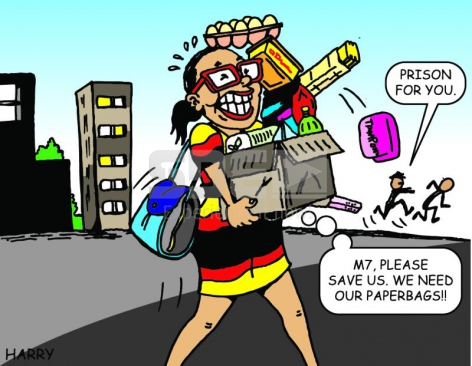
Ugandan’s environment watchdog, Nema, has finally began ruthlessly implementing the ban on polythene bags, commonly referred to as kaveera, of less than 30 microns (Gosh! Do they expect us to walk around with tape measures!). This is after almost two decades, following protests and a lawsuit by the business community. Traders have in effect began to pack the goods in biodegradable material like paper bags, cloth bags and nylon bags which can be used more than once.
Up in arms
When you do your shopping in Kampala, carry a bag or plan to pay extra money for a nylon or cloth bag to carry your goods.
If the Uganda Revenue Authority (URA) is to be believed most of the buveera in Uganda come in through smuggling and over 14.5 tonnes were impounded last year, coming in from Kenya.
Currently, Nema has collected more than 12 tonnes of buveera so far, which makes me wonder whether the smugglers include supermarket chains that have their own polythene bags. Downtown, its business as usual with the ubiquitous black and green kaveera being used to pack wares. Traders are up in arms. They claim Nema has to wait for them to finish their buveera stock before they implement their ban.
Wananchi have no way of determining microns and thus we are bearing the brunt of the games between Nema, government and the traders. After work, we usually swing via the supermarket to pick a packet of milk and one or two snacks for the children. This usually builds up to a full shopping basket by the time you reach the till, and you simply watch the receipting to ensure you have the requisite funds. Katemba begins when your goods are to be packed.
I knew Nema were serious with the ban when my goods were packed in a brown paper bag after shopping at a local supermarket. A fellow shopper, however, had much to complain about as she had a number of things and the three huge brown paper bags were quite a handful for her to manage.
Delicate balancing act
She was going to board a matatu but opted for a boda-boda. The rider was to tie the goods at the back and make one big parcel as she carried the perishables on her lap. I couldn’t help but marvel at the delicate balancing act. Perhaps, the ban will encourage us to have more children to help us to carry the shopping home.
I was reminded of the ban again the next day. I had ducked into a supermarket near the office for some quick shopping and was shocked when the cashier asked me where I planned to put it. I only had my purse, and wondered why she didn’t ask when she was tilling my items for payment. They offered me a carton but when I imagined the horror of walking in town with a carton, or the office gossip regarding my new side hustle as a vendor. I opted to buy a bag.
When I narrated my woes to a workmate, she told me I was lucky. She had done her monthly shopping and her goods were duly packed in a carton. Upon reaching her car, the shop attendant told her he needed to return with his carton and they had to ‘pour’ the whole shopping onto the back seat of her car. By the time she got home, the onions and apples had rolled under the front seats,and one of the milk packets had burst all over the back seat. These were additional costs and buying a bag would have been cheaper. At this point, together with fellow Ugandans tusabe gavumenti etuyambe (we ask the government to intervene and save our souls)!
 The Standard Group Plc is a multi-media organization with investments in media
platforms spanning newspaper print
operations, television, radio broadcasting, digital and online services. The
Standard Group is recognized as a
leading multi-media house in Kenya with a key influence in matters of national and
international interest.
The Standard Group Plc is a multi-media organization with investments in media
platforms spanning newspaper print
operations, television, radio broadcasting, digital and online services. The
Standard Group is recognized as a
leading multi-media house in Kenya with a key influence in matters of national and
international interest.









